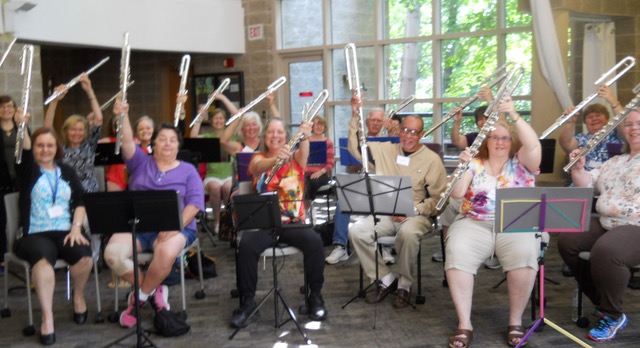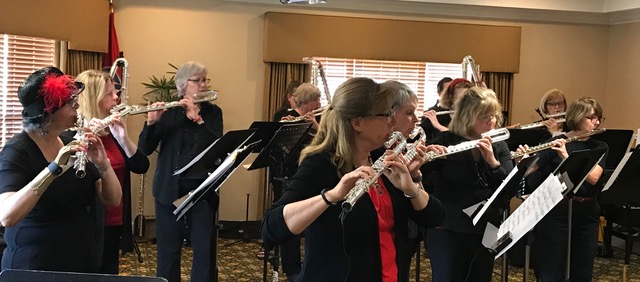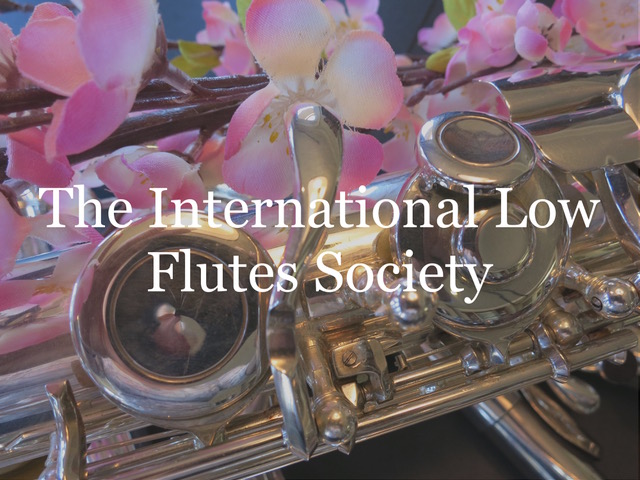Chris Potter is the President of the Low Flutes Society and organizer of the International Low Flutes Festival (https://lowflutesfestival.org/) in April 12-14, 2024 in Washington, DC.
KW: What’s your origin story? When did you catch the low flute bug?
CP: This happened in the early 70s. At the university I was attending, they happened to have an old Haynes alto flute which the band director bought from a pawnshop. I was working on the first movement of the Bach Partita. I thought since we’re always looking for new ways to practice something, if I can play this on alto, it should seem easy on C flute. It was a straight head alto and it was just too much of a right hand twist. Ergonomically it didn’t work for me so I never considered pursuing alto as a third instrument. In 1976, I went to my very first NFA convention in Atlanta and there was a curved head alto in the exhibit hall! The sound and response was fantastic and I had to have it, but I had no money. I was finally able to save enough money to buy one in the fall of 1982, right when I moved to Boulder, Colorado. The instrument was a Prima Sankyo and was just as fabulous as I remembered. Now I had this wonderful instrument and found that there was very little music for alto in the sheet music stores. I was determined to find out what was available. I was teaching at a music store in Denver that had file drawers full of catalogs from all the different publishers. Every time I would teach, I’d go early and look through the catalogs. Eventually, I had a list of all the pieces with alto flute. I published a copy of the list because I figured other people also might want to know what alto music was out there. Later, I got a letter from somebody who made altos and wanted to purchase a few copies of the list to give to people who bought her flutes. It was Eva Kingma and I had no idea who she was at the time! We met for lunch at the next NFA convention and then I learned she made basses too. So I went to her table, tried one and said to myself I’ve got to have this, a bass that actually plays! I of course bought one a few months later. A big break came for me when Patti Adams was the program chair for the 1997 NFA convention in Chicago. She approved my proposals for some low flutes-related events, one of which was a performance of Randall Snyder’s Concerto for Alto Flute and Flute Ensemble, a very difficult piece. People heard me play it and low flutes performance opportunities started coming my way.
KW: This is one of the reasons why we need festivals like the International Low Flutes Festival and the NFA Conventions. You have to go and hear it because you don’t know what you don’t know until you discover it!
CP: It’s so true. I never knew there was a curved head joint alto until I went to that convention in 1976. There are many innovations and solutions to problems that you only discover coming to a convention or festival. The low flutes community is becoming bigger and world wide. You meet people at big events like this and develop opportunities with people to create projects together.

KW: Why did you start this festival in the first place?
CP: I could tell that interest was really growing. The instruments were getting better and better. More people were playing them. I attribute some of this to the baby boomer population with lots of people who were retiring or their kids were now out of the house. They still wanted to play but they didn’t want to do the really fast finger wiggling. Playing alto became a way of staying in a flute choir and not having to play the really hard exposed parts. Also, more people were hiring me to play and there was interest in me commissioning pieces to play at these performances. Another reason I started the Festival is that low flutes do have problems that are different from C flutes. Some of us have solved those problems and are happy to share that information with as many people as possible. A festival is an effective way to do just that. In 2017, I decided to organize a low flutes festival for the spring of 2018. I didn’t have much infrastructure set up yet, but was pretty sure it would be successful. I had to put up quite a bit of my own money because you have to deal with a hotel. You have to commit to paying for expensive meeting rooms and reserving the block of hotel rooms. It’s a big financial commitment, but I did it and it was really fun. We have recently concluded that our mission as an organization is information sharing and cooperative projects, not competitions. We did have an alto flute competition in 2018 and a bass competition in 2022, but I gave money left over from the 2018 festival to the NFA to start their alto competition that they have now turned into a low flutes competition. Go NFA!
KW: I attended and performed at the 2018 International Low Flutes Festival and was struck by how friendly and welcoming the low flute community was to everybody.
CP: Many people have said the exact same thing. Low flutes players are often more friendly, more accepting, more inclusive. We’re just there to have fun. In general, low flutes players are not competitive because there are no jobs for us. We are more interested in hearing new pieces, commissioning new music and sharing information with each other.
KW: I’m interested in unexpected discoveries in the low flutes world. What is the coolest thing? On the other side, what did you find unexpectedly difficult?
CP: I knew somebody who had a foundation and a reasonable amount of money to spend to commission pieces. She wanted Matthias Ziegler to write a piece and he said he would. He wrote Low Flutes at High Tides and we were scheduled to premiere it at the 2012 Las Vegas NFA convention. Matthias has discovered completely unique sounds and new ways of creating and notating them. When we first read the piece, it was horrible, absolutely dreadful! I was in shock because we had to perform it in two days! Then he came to the second rehearsal and said “this is how you do this, this is how you do that.” We had great players and his instructions made it possible to produce the sounds he wanted. The performance of the piece was absolutely stunning – talk about goose bumps!! There were certainly extremes of emotions within that short period of time.
Another very memorable moment occurred In Anaheim in 2010 when we presented our very first NFA Low Flutes Committee program. There were 45 of us in the closing ensemble including two double contras. We were on a plywood stage, premiering a piece we had commissioned titled Voices from the Deep by Alexandra Molnar-Suhajda. The floor was wildly vibrating throughout the piece and it was incredible to have the piece come alive in that way! People in the ensemble were taking off their shoes to feel the vibrations. Another breath-taking moment you don’t want to end.

KW: What are the most important things that you want potential attendees to know?
CP: There will be something for everybody. There are 93 events including a presentation referencing the Barbie movie and on the other end of the spectrum, a Lebanese composer dissecting her three-part fugue. There are opportunities for everyone to play: there is a sight reading session every day. Our opening and closing choirs are very popular and almost at room capacity at this point. There are many performances by people like George Pope, Alexa Still, Matthias Ziegler, the Turkish Flute Ensemble and Ali Ryerson. We have Composer Spotlight concerts featuring the music of Gary Schocker, Nicole Chamberlain, Jonathan Cohen, Paige Dashner Long and Ali Ryerson. Our focus this year is contrabass and we have a ContraJam Ensemble with 32 contrabass players (and counting!) premiering two new pieces by Paige Dashner Long and Jonathan Cohen. Be on the lookout for a Contra Parade!
KW: Do you have tips for traveling with low flutes?
CP: Flight crews are, for the most part, very nice people. If you say you have a musical instrument, they will find a place in the cabin to put it. But be nice!!!!! Have just the case and one other item. My bass becomes my personal item and I have a backpack with my alto that is my carry-on. There’s a Wiseman case that holds four instruments including a contra that will actually fit in most overhead bins. Also, pay extra if necessary to make sure you’re in the first two groups to board. If you’re really worried, buy a second seat. Here’s a link to a video Paige made about travel tips (https://www.youtube.com/watch?v=c0ZRy55wgMQ&t=880s). We can’t guarantee that this will all work out, but my experience is that 99.9% of the time, it’s not a problem. But you have to be nice!
Click here for more information, including how to register, about the International Low Flutes Festival! Hope to see you there!

